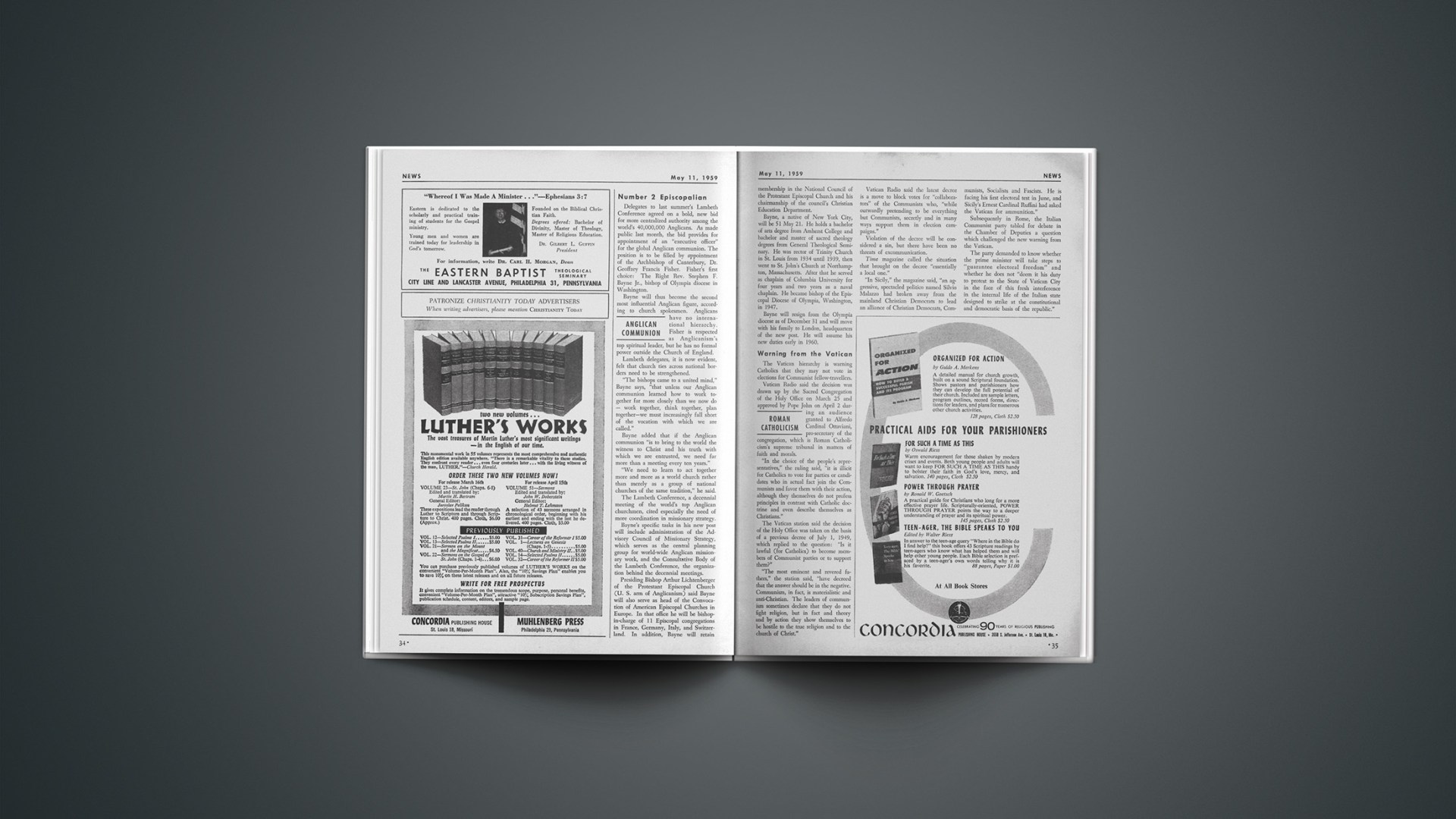Special Report
American Presbyterianism edged closer this month to a doctrinal test on the virgin birth involving the presidency of one of its major schools, San Francisco Theological Seminary in suburban San Anselmo, California. The issue may reach the floor of the 171st General Assembly of the United Presbyterian Church in the U.S.A., in Indianapolis, May 20–27.
In the background of the dispute stands the famed Westminster Confession, which states: “The Son of God … did … take upon him man’s nature, … yet without sin: being conceived by the power of the Holy Ghost, in the womb of the Virgin Mary, of her substance.”
Immediate occasion of Presbyterian concern is an editorial by president-elect Theodore A. Gill, in which he asks, “What of us who make the Virgin Birth no part of our personal confession, however often liturgical obedience involves us in its public repetition …?” (April 2, 1958, issue of The Christian Century, which Gill served at the time as managing editor). The editorial is unsigned, but Gill acknowledges its authorship (see an appraisal in “Review of Current Religious Thought,” CHRISTIANITY TODAY, April 13, 1959, issue).
Glendale (California) Presbyterian Church, distinguished for its benevolences and missions support, has memorialized the General Assembly, by unanimous action of its session, to deny confirmation of Dr. Gill’s appointment. The memorial is being circularized to the 200 churches of Los Angeles Presbytery urging them to take similar action. The session’s Committee on Christian Education had threatened to withhold financial support from the San Anselmo seminary until doctrinal uncertainties were resolved. The church has a membership of 3,150. Its minister, Dr. Clarence Kerr, recently retired after 16 years service, had interrogated Gill about his theological views. Kerr regards Gill’s appointment as a grave threat to the “peace, unity, and purity” of the church.
The Glendale memorial states: “This session has heard with great concern the statements made in print and otherwise by the present acting president of San Francisco Theological Seminary … We particularly refer to the editorial … entitled ‘A Choice of Miracles.’ … We find that no one could possibly recite the Apostles’ Creed with honesty and still agree with the expressed liberal beliefs of Dr. Gill; and the thought of subjecting our ministerial students to such bizarre biblical interpretations is extremely objectionable. We therefore request the General Assembly to deny the confirmation of Dr. Gill to such a position in our denomination.”
Dr. William D. Livingstone, whose First Presbyterian Church of San Diego is the second largest in the denomination (membership: 5,121), voiced anxieties over the San Anselmo situation in a Sunday sermon heard by a radio audience and three morning congregations.
“I feel compelled,” said Livingstone, “to express my own concern over the allegedly doubtful views of one of our new seminary presidents regarding the virgin birth of Christ. Now this may not mean anything to you. You may not be a Presbyterian or perhaps the problem doesn’t interest you. But surely no president of a Presbyterian seminary with the responsibility of training our young ministers ought to hold any other than the fullest and most affirmative view of the virgin birth of our Lord Jesus.”
He called it a “strange thing when the debate of scholars is set over against the authority of the Bible itself.”
Other ministers discussed the matter with lay leaders, and some commissioners to the General Assembly were prepared to cast protest votes against any ratification of Gill’s appointment.
Gill conceded that the “peace and harmony of the church are at stake.” For this reason, he said, he is reluctant to answer charges against him. He says he welcomes discussion on the virgin birth, but stipulates that any exchange of views be in accordance with established procedures within his denomination. “The church,” he asserted, “says what is discussable.” Gill’s critics, in turn, claim that it is he who originally stirred up the controversy by publication of an editorial which differed with the Westminster Confession.
Gill was asked by a reporter if he believed that Jesus Christ had a human father, a question which he had answered previously to Kerr’s dissatisfaction. The president-elect refused to answer the question, noting that he would not be drawn into discussion of the “mechanics” of the doctrine. “I draw a curtain of reverent mystery around the birth of Christ,” he said.
Through personal contacts Gill is known recently to have convinced a number of strongly evangelical ministers that he holds the historic doctrines.










